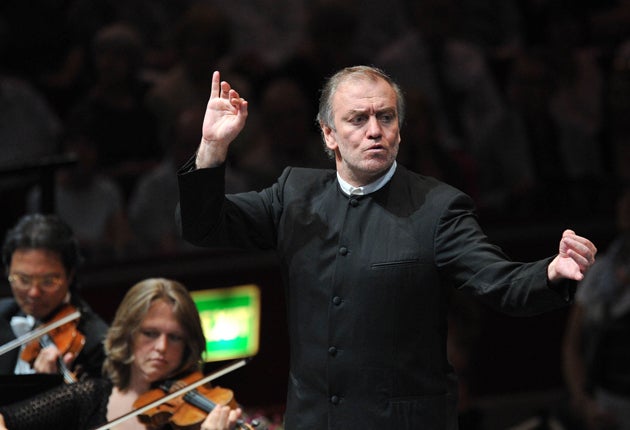BBC Proms: World Orchestra for Peace / Tilling / Gergiev, Royal Albert Hall, London
Serene mix of peace and harmony

Vladimir Putin's favourite conductors both travel with excess baggage.
The paedophilia court-case arising from Mikhail Pletnev's alleged parallel life in Thailand has suddenly overshadowed his Western activities: when Britain's popular press got its claws into him, it was a foregone conclusion that he would be forced to withdraw from the Proms. Meanwhile, Valery Gergiev's anti-Georgian warmongering (when Moscow and Tbilisi came to blows two years ago) makes his position as conductor of the World Orchestra for Peace somewhat piquant. But here he was, and here they were, presenting the second of two consecutive nights of Mahler symphonies.
Set up by Sir Georg Solti in 1995, this band consists of principal players from orchestras all over the world, and by definition they can't spend much time together. How much rehearsal time did they have for this concert? Not enough, one sensed, as they launched into the filigree-delicate opening movement of Mahler's Fourth, with its woodwind and sleigh-bells ringing out over gentle strings. This movement felt businesslike rather than magical, and for its spell to work, every moving part in the complex edifice must be controlled with fastidious precision. The second movement is designed to start with a very particular frisson, as a solo violin tuned sharp is played like a street musician's fiddle against the well-bred backdrop of the orchestral strings. Here, that moment, which depends on a refined set of sonic balances, went for nothing. But the further this genially sunlit work progressed, the more it came together, and soprano Camilla Tilling's paean to the joys of Mahler's (very strange) child's-eye view of heaven made a gloriously serene climax.
Join our commenting forum
Join thought-provoking conversations, follow other Independent readers and see their replies
Comments
Bookmark popover
Removed from bookmarks